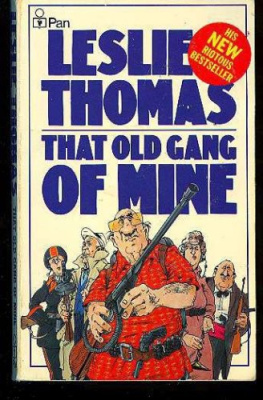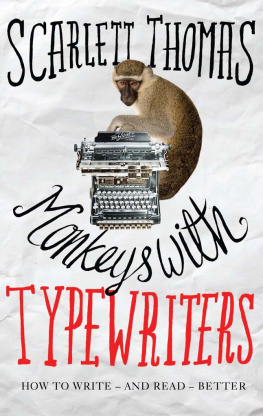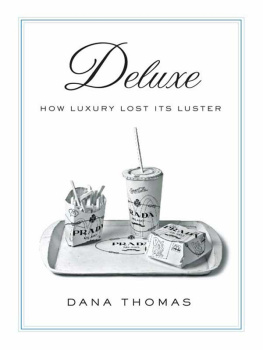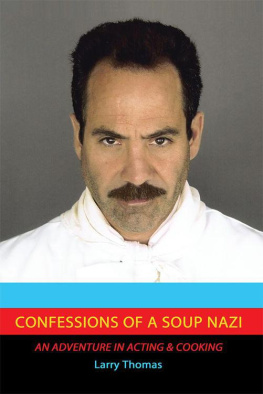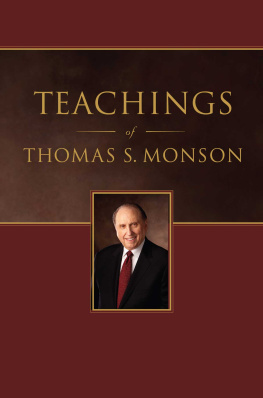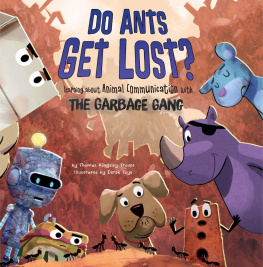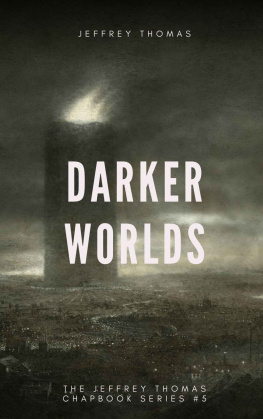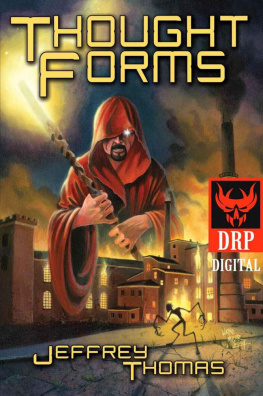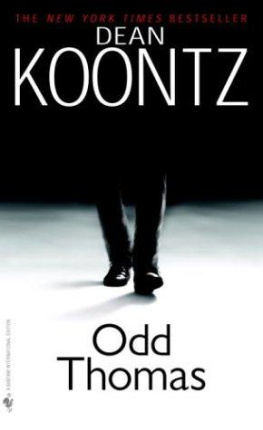Thomas - That Old Gang of Mine
Here you can read online Thomas - That Old Gang of Mine full text of the book (entire story) in english for free. Download pdf and epub, get meaning, cover and reviews about this ebook. City: London, year: 1979;1980, publisher: Pan Books, genre: Detective and thriller. Description of the work, (preface) as well as reviews are available. Best literature library LitArk.com created for fans of good reading and offers a wide selection of genres:
Romance novel
Science fiction
Adventure
Detective
Science
History
Home and family
Prose
Art
Politics
Computer
Non-fiction
Religion
Business
Children
Humor
Choose a favorite category and find really read worthwhile books. Enjoy immersion in the world of imagination, feel the emotions of the characters or learn something new for yourself, make an fascinating discovery.
- Book:That Old Gang of Mine
- Author:
- Publisher:Pan Books
- Genre:
- Year:1979;1980
- City:London
- Rating:3 / 5
- Favourites:Add to favourites
- Your mark:
- 60
- 1
- 2
- 3
- 4
- 5
That Old Gang of Mine: summary, description and annotation
We offer to read an annotation, description, summary or preface (depends on what the author of the book "That Old Gang of Mine" wrote himself). If you haven't found the necessary information about the book — write in the comments, we will try to find it.
Thomas: author's other books
Who wrote That Old Gang of Mine? Find out the surname, the name of the author of the book and a list of all author's works by series.
That Old Gang of Mine — read online for free the complete book (whole text) full work
Below is the text of the book, divided by pages. System saving the place of the last page read, allows you to conveniently read the book "That Old Gang of Mine" online for free, without having to search again every time where you left off. Put a bookmark, and you can go to the page where you finished reading at any time.
Font size:
Interval:
Bookmark:
That Old Gang Of Mine
by Leslie Thomas
Scanned by Bill
one
'This is Station WAIA, Miami, a bee ... utiful morning, people. We expect a high of seventy-eight degrees today, a low of sixty-two tonight, with a twenty per cent chance of rain. It's real good to be alive ... Station WAIA, your music way, serving the Golden Coast from the Palm Beaches to Key West.'
The pelican cruising down from Palm Beach, Florida, towards the islands of the Keys that January day had fine flying weather. A gentle wind sniffed from the south-west but there were few clouds and the long golden arm of Miami Beach was in good shape. A remote storm in the night had disturbed the sea and there were surfers at Pompano; at Fort Lauderdale basking ranks of vacationing college students, boys and girls, blew bubble gum. Rich old widows in bikinis and pastel pink knee boots, which hid their varicose veins, sunbathed at the Fontainbleu Hotel and many blocks down, along Ocean Drive, South Miami, two thousand elderly folk sat on small chairs beneath the sea-grape trees.
The Golden Coast to which radio station WAIA, Miami, refers in its call sign stretches for two hundred miles from Palm Beach on the Atlantic seaboard of Florida, through Boca Raton, Pompano, Fort Lauderdale, Hollywood, and a dozen other seaside conurbations, through Miami Beach, sepa rated from Miami proper by fine lakes and lagoons, and then south to the curving small islands of the Florida Keys which terminate in the city of Key West, the most southerly in the United States.
South Miami Beach lies roughly halfway down the distance, an area gradually diminishing to squalor, in contrast to the expensive real estate only a couple of miles to the north. Once it was the Miami Beach, but now it slips a little with each season. It has become a museum of art deco buildings of the nineteen twenties, inhabited by a tribe of old people, ninety per cent of them Jewish, many impoverished. They have colonized it with that special talent they have for colonizing;
it has kosher shops and kosher hotels, synagogues, talking places like salt beef bars and selected shady trees and Jewish social centres. The accents and dialogue of twenty old countries can be heard on Washington Avenue or Ocean Drive. For these are the people who once arrived in America for a new life. Now they have almost had that life and they sit in their collapsible canvas chairs and watch the sail boats and the automobiles of the new generations.
There is not much money about, the people do not live or eat extravagantly, but they stick together beneath the Florida sun. They believe that it lengthens their days, days spent in inactivity or in pseudo pastimes. The people are no longer useful. Frequently they have been sent to South Miami Beach by families who have ceased to have time or space for them. A cynic has called the place God's Waiting Room.
As the ungainly pelican creaked on his journey that morning he might have spotted on the South Beach a solitary figure in red vest and shorts, running steadily with the shore line, a man known as Ari the Greek, sixty years of age. Although at that moment he was unaware of it, he was about to become involved in one of the most bizarre series of crimes in the history of the state of Florida.
He ran every day on the beach. Most of his fellow pensioners sat where the grass was clean and cool beneath the sea-grape trees, but there were a few who were on the sand and they exchanged waves and words as he jogged by.
'Hiya Ari! Still running?'
'If I'm running I'm living!' the Greek called back, hardly panting. He had a strong Mediterranean face although he had lived in Jacksonville, Florida most of his life. In Prohibition days he had been a bootlegger, then he had operated a pancake house and later branched out into hotdogs. His hair was just a memory and his large nose seemed to have features all its own, like a second face. He drew abreast of a barefoot woman in a red dress, plump as a strawberry. They called her Molly Mandy and she was searching for treasure with a metal detector. She saw Ari call to her but she did not hear because of the dishes clamped over her ears. She obligingly pulled one of the dishes away and extended the exposed ear towards Ari.
'What d'yer say, Ari?'
'I said have you found something? Like treasure?'
'Jeez, I swear this machine makes you deaf.' She switched off the detector. 'Now what d'yer say?'
Ari jogged on the spot as though fearful of letting his momentum run down. A dollop of sweat careered down his nose and hit the sand at his feet making a hole like a bullet. 'Molly, I said have you found anything?' he repeated patiently. 'Like treasure?'
'Sure, sure,' Molly nodded. She had serene Jewish features, deep, dark eyes, broad forehead, hair grey but neat. She should have been sitting in the comfortable house of her elder son in White Plains, New York, where he was important with the telephone company, but his wife did not like her being around there. They had told her she would like it better down on Miami Beach in the sun. She had innocently believed them. 'Yesterday I found gold like Fort Knox never had, Ari,' she joked. 'Ten million dollars in gold! How about that! But I figured I just couldn't give up looking. Like it's a hobby.'
'I know just how you feel,' nodded Ari understandingly. 'Like I.'m in the American Olympics team. It provides something to do.'
He slipped into gear and started off again. "Bye now, take care,' Molly called automatically after him. She clamped the dogs around her ears and returned to searching the empty sand. Half an hour later she found a nickel and a dime.
Ari habitually terminated the beach section of his run by the comfort station coyly labelled 'Boys' and 'Girls', near the place where the City of Miami, with a stroke of tactless genius, had erected a large concrete calendar recording the time, date, day and year. If there was anything the many people in that region did not need it was a calendar. Had they been more militant they might have blown it up. As it was Ari projected a spirited raspberry at the object's timeful face which brought a wry laugh from some old men playing dominoes in the shade. Ari did that every day. It was not much of a defiance, but it was something.
The Greek crossed Ocean Drive, the street running parallel with the sea, but divided from the beach by the grass and the
sea-grape trees. He went up Eighth Street on to Washington Avenue. It was hot now and his padding feet made prints in the sidewalk dust. There was a kosher shop advertising guaran teed clean water at twenty-five cents a jug, bring your own jug. He curled his lip because he did not go along with all -these Jewish precautions, but it made him feel thirsty and he began to look forward to the lime juice he always drank after his exercise.
There was a small funeral on Washington. They never had big funerals in those parts because, in general, people did not enjoy attending them. This was just two cars, one with the coffin and the other with a clutch of bland and blank mourners. The cortege had halted at the traffic signals and the driver leaned out and mopped his brow with an appropriately black handkerchief. Ari, as if he were a motor vehicle, pulled up and ticked over also, his old but muscled legs slowing carefully like pistons. He knew the hearse driver, a violently cheerful young man who also drove a truck for an anti-bug, delousing company doing business with the small hotels. They often joked about the young man scratching a living.
'Who's travelling?' asked Ari, watching the traffic lights. He nodded casually back towards the coffin.
'Guy called Sylvester, I think,' replied the driver. 'Resident at the Beau Park.'
'Don't remember him,' shrugged Ari.
'Not many do,' said Herbie casually. 'There was no interest He left ten dollars each to pay for some mourners.'
Next pageFont size:
Interval:
Bookmark:
Similar books «That Old Gang of Mine»
Look at similar books to That Old Gang of Mine. We have selected literature similar in name and meaning in the hope of providing readers with more options to find new, interesting, not yet read works.
Discussion, reviews of the book That Old Gang of Mine and just readers' own opinions. Leave your comments, write what you think about the work, its meaning or the main characters. Specify what exactly you liked and what you didn't like, and why you think so.

